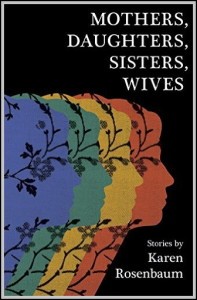Karen, your novel Mothers, Daughters, Sisters, Wives is a set of short stories following a collection of families and their experiences. You focus on the experiences of the women in the family, and a strong theme of faith comes out: belief in the afterlife, how belief/faith influences choices, and how this trickles down through posterity.
 First, this is a short story collection, not a novel. The stories explore the concerns of fictional women in four different families, families unrelated to each other. I wrote the stories over the course of several decades. Sometimes I would return to a character at a different point in her life; sometimes I would focus on a different character in the family story. I have become very attached to the women in these families. Some are roughly modeled after women in my own family history. I am keenly aware of the influences on me of my mother and my grandmothers and wanted to write about family connections.
First, this is a short story collection, not a novel. The stories explore the concerns of fictional women in four different families, families unrelated to each other. I wrote the stories over the course of several decades. Sometimes I would return to a character at a different point in her life; sometimes I would focus on a different character in the family story. I have become very attached to the women in these families. Some are roughly modeled after women in my own family history. I am keenly aware of the influences on me of my mother and my grandmothers and wanted to write about family connections.
Thank you for that correction. As a novelist, I can get a little “novel-centric.” The stories flowed so well together, it read, for me, like a novel and not a collection of short fiction. And I think this speaks a great deal to your writing ability.
I’d say that all of the women in your story are strong women, and that I’m left with a message that faith and orthodoxy aren’t the same, and that they don’t even necessarily come together often. In your stories, they don’t. Can you elaborate on this theme a little bit? What drew you, first of all, to choose generations of women as your vehicle. And this theme of faith–did you have a message you wanted to bring across?
Although I don’t “appear” in any of the stories, many of the conflicts these women face are conflicts I have faced. As you have noted, many of the conflicts deal with religious faith, in particular the Mormon faith that apparently sustained the mothers of the characters. (I say “apparently” because, if we delved into the minds of some of those mothers, we might find they too had hard times with belief.)
One other theme I found common in this book is that of “leaving the faith.” Literally, leaving faith behind, but also leaving the LDS church. It’s interesting how this book leans heavily on perspectives of those who have chosen to walk away from the LDS church… who don’t believe anymore, or never quite found their beliefs lined up with the LDS faith. I found it refreshing, because it put us firmly in the shoes of women who are strong, loving, good people who have simply chosen not to participate in the trappings of the LDS church. And you present it in an unapologist way… what led you to choose this perspective/bring this sort of narrative to the forefront in your stories?
The main characters in the Maren stories have been able to believe enough to consider themselves Mormons. Maren and Dinah both have nonbelieving husbands, but the women have worked out a way to live—not unhappily—inside a Mormon world. (You’re right in that I don’t equate faith and orthodoxy—these women aren’t very concerned with orthodoxy; they are Mormons on their own terms.)
For a variety of reasons, the women characters in the other three sections of the book have left the Mormon faith. Some struggled, for a while, to stay. Some have grown to question the existence of any God. For none was the departure easy; for none, perhaps, could it be complete.
We run a whole gamut in this series of perspectives… birth and growth, lives that build and bear fruit, and then end-of-life—death. You portrayed well how faith crises seem to happen at various stages… various stepping–off-points, I guess you could say. I was very touched by how the stories concluded with the inescapable faith crisis–is there life after death. And how well you portray that the need to believe that lives go on after death fuels a necessary hope, that could be counted as faith. Do you mind elaborating on that?
If I have a “message” about faith, it would be this: those who have the gift of religious faith (not just Mormonism) are probably happier than those who do not. Even if they have a “troubled faith,” they may find more meaning in both life and death than those who do not believe. But many, after examining their faith, cannot will themselves to believe. Their loss of faith is usually onerous and traumatic. A middle position might be, like that of Lauren, to consider the possibilities of faith and what it might entail—the existence of God, the realty of an afterlife—with wonder and, perhaps, hope. But what does it take to perpetuate this wonder and hope?
Carma is my character who searches and suffers the most. In “Out of the Woods,” she says to her devout husband, “I just don’t believe it anymore. I’ve tried to believe it. I’m not saying it’s not true. It’s true for you. I even want it to be true for you. You should do what you have to do. And I should do what I have to do. I have to stop pretending it works for me.”
And yet, for even Carma, there might be a tiny chance for hope.
You may have noticed I have a lot more questions than answers!
I think that has to be true for everyone who is really working on a testimony of something. If you don’t have questions, how do you get answers? I appreciate the honesty of this work: Mothers, Daughters, Sisters, Wives. I unreservedly recommend it to everyone for this reason and many others.
Thank you, Karen. It’s a pleasure. We appreciate your voice here at AML!
Karen Rosenbaum could be considered one of AML’s pioneering members. She was an advocate for LDS writers and writing long before AML’s inception, has volunteered a lot of effort as a teacher, editor and storyteller, and has added a great deal to the community and the literature. In 2014 she was made an honorary lifetime member . Her short story collection Mothers, Daughters, Sisters, Wives, which won the 2015 AML Short Story Collection Award, is available for purchase here.

